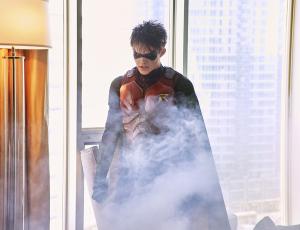In a show that has gone out of its way to blur the line between the good guys and the bad guys, in the latest episode of Titans, “Jason Todd,” we are told that perhaps there are at least some bad actions, and that those bad actions have consequences.
In the last episode, we met the new Robin. Now we learn that he has been sent by Batman to get Dick’s help investigating a series of murders [it should go without saying that there are spoilers from here on out]. The circus, um… employees that Dick had known growing up are being murdered one by one using the methods of the crime family who had ordered the deaths of Dick’s parents. Dick, as Robin, had caught the killer, but when he learned that the police had cut a deal he stopped the police van transporting the murderer in order to at least beat him up, if not actually kill him. When the crime family arrives to kill the murderer-turned-snitch, Dick does nothing to stop them. This act of revenge, in turn, has consequences when the crime family goes on to kill all of the snitch’s family as well. Years later, the snitch’s son, “the Melting Man”, is now murdering Dick’s circus family as a means of getting his own revenge.

We see a similar trend at work in the character of Jason Todd. The “new” Robin is also driven by revenge. He spent his youth on the streets being abused by cops, and now that he is Robin as soon as Batman’s back is turned he takes the opportunity to get his revenge by beating up the police. Dick warns him that the direction he’s going will end badly and that he won’t be able to control what he’s becoming. (Readers of the comics will know this is true, as Jason Todd met an especially grisly end—by the decision of comic book fans themselves.)
This is the first time we see genuine moral reflection from a character in this show, and even if it is ham-fisted at least it is worthwhile moral reflection. What’s more, it is reflection that works well in the Batman (well, “Titans” universe). The basic principle of justice is “eye for an eye.” But it is not our place as individuals to pursue that form of justice. Legitimate authorities are established to do so. When those authorities fail revenge is not only not a legitimate substitute, it is an actively destructive replacement and often becomes self-perpetuating, rather than ever truly being satisfied. This episode of Titans makes all of those points and then rubs them in our faces for an hour. Or fifty minutes or whatever.
With that said, we’re also not really presented with an alternative. “Revenge is bad and creates a cycle that is hard to escape” is a true lesson, but it is still a negative principle, and we are not given the positive replacement. What should Dick have done instead of pursuing revenge? We’re simply not told that. Which makes sense, because only Christianity can speak to this situation. Only Christianity speaks of a God who is the aggrieved party, the perfect Judge, and the forgiving Father who has Redeemed His people through the atoning sacrifice. Only Christianity teaches that rather than seeking for revenge, we are to forgive our enemies and actively work for their good not because they (or we) are good people deep down, but because of the great act of forgiveness accomplished for us on the cross.
Not that I expect that kind of message to make its way into a show like Titans, even if this episode does crack the door open a bit in that direction…
Dr. Coyle Neal is co-host of the City of Man Podcast and an Associate Professor of Political Science at Southwest Baptist University in Bolivar, MO.













